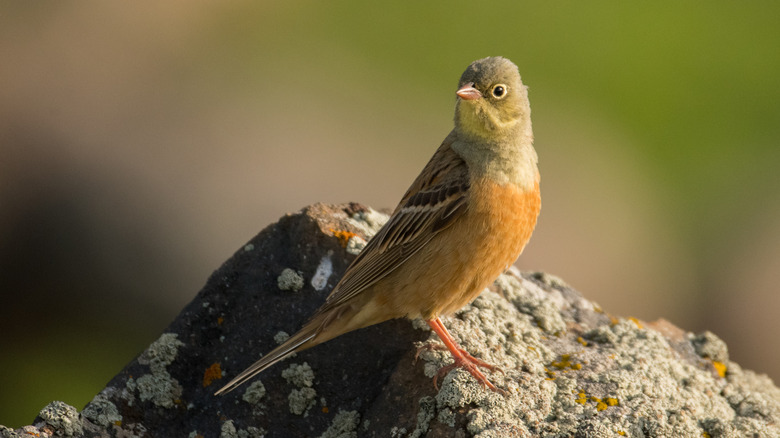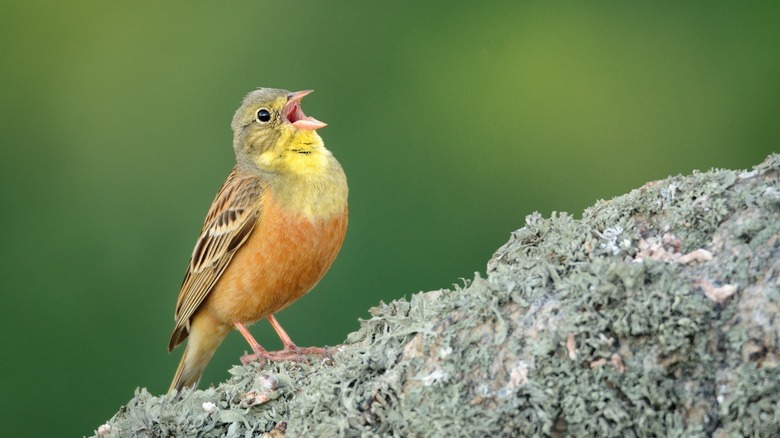Ortolan: The Controversial French Delicacy You'll Probably Never Try
In the wide world of cuisine, there are certain dishes that can spark the imagination, stretch the limits of food, and sometimes can be so good they become illegal. Amongst the likes of foie gras, shark meat, and turtle soup sits the controversial french ortolan. "Ortolan" or "ortolan bunting" is the name of a small yellow-brown songbird that is native to certain parts of Europe and western Asia. It is a migratory bird, and the dish that bears both its name and its flesh has been traditionally prepared, eaten, served, and enjoyed as a symbol of class and high society for centuries, per Eater.
More recently, however, there has been some controversy surrounding this particular dish and the practices surrounding its preparation and consumption, skyrocketing ortolan into the culinary annals of infamy. Ortolan and the chefs that choose to prepare it have been antagonized not just by individual organizations, but there are now laws prohibiting these little songbirds from being served.
How it's prepared and eaten
In preparation for the dish, the ortolan is first force-fed millet and other grains to fatten them up considerably. The idea of heavily feeding animals is a practice that is done throughout the meat industry, but the particular method of force-feeding has been criticized as unnecessarily cruel. Then, to kill the birds, they are drowned in Armagnac brandy, according to The Smithsonian Magazine.
Once prepared, cooked, and served, diners traditionally first hide their faces by draping a napkin or cloth over their face. Then consume the bird whole. In one bite, bones and all. All except for the beak. Some of the more colorful accounts of this odd ritual may claim that this hiding of the face and obscuring of the vision is some carnal expression of shame, but more likely, this it's just a convenient and practiced way to consume a whole bird without making a mess.
Appearances in media
Knowing these uniquely entrenched customs flying around this little yellow songbird, it's not hard to see how ortolan, as a symbol, is a writer's dream. It's cruelly poetic, steeped in dramatic and ritualistic overtones, and deliciously inaccessible to all but high society.
Showrunners and stream subscribers can't seem to get enough. "Succession" and "Hannibal," both shows that feature simultaneous undertones of gore and hunger, are two such shows that really get their symbolic hands dirty by featuring Orotlan, per Slashfilm. Ortolan seems to have perfectly captured the morbid curiosity and sensual horror of these two wildly popular shows in just one bite.
It's so prevalent that ortolan is even used as a joke. Synonymous with bougie culinary snobs, shows like "American Dad" and "Brooklyn Nine-Nine" feature lines that really drive home how unnecessarily pretentious and unaware ortolan can seem to people who neither know nor care for its existence.
Legality and ethics of ortolan
The traditional methods of consumption may seem unnecessarily garish or macabre, and the preparation can be seen as downright cruel, which has led to a good deal of controversy about the ethics of serving and eating ortolan, per CNBC.
Nevertheless, selling ortolan is illegal in the United States and the European Union, including France, where the dish originated. But this is not so much due to the upsetting processes surrounding its consumption but rather the population levels of the bird. According to Luxury Academy, ortolan, thanks in large part to the dish's popularity, is an endangered species, having been hunted to dangerously low levels in the past. According to Forbes, these new laws have helped restore the ortolan population, and as a response, there has been a growing movement to get them back on the menu.
Despite the legal action, protection by numerous laws has not been enough to stay the hungry, and ortolan can still be found and purchased in various black markets around the world. Less than a pound of flesh is available for a pretty penny, a hidden face, and a single leftover beak.



